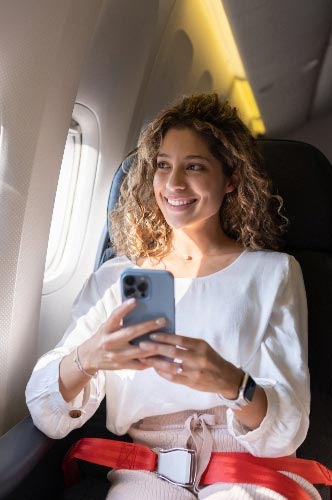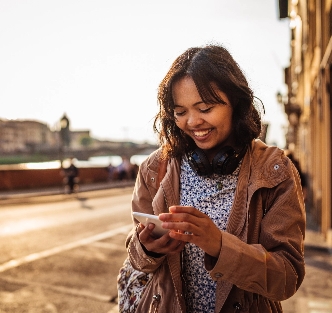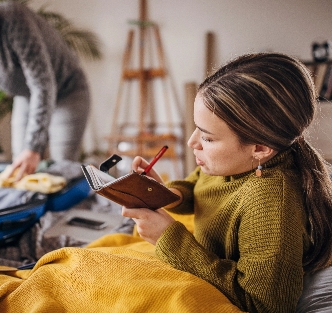Women’s Travel Safety-
Be aware, alert and confident.
Whether you are a business leader, student or stay-at-home moms, our helpline guide contains tips to minimize risks and help women make their journey safe and enjoyable. Travel, either domestic or international, poses risks for anyone. It is possible to become a victim of a crime, experience a medical emergency or become impacted by a natural disaster. Travelers may not be familiar with the language, culture, or security threats of a particular destination, leaving them vulnerable to potential harm.
Tips and Advice from Female Travelers at National Women Helpline, India
Plan Ahead and Be Prepared
- If you are going on a personal trip make sure to research and buy travel insurance or if you are going on a business trip ask your employer about their business travel insurance program.
- Save an electronic and hard copy of the travel insurance benefits. Share your travel insurance details with a trusted family member.
- Share your itinerary with a trusted family member or friend and establish regular check-ins, especially if traveling alone.
- Check your government’s website, and if the option is available, enroll your trip so you can receive alerts from your embassy. Your embassy can also contact you in the event of an emergency. For instance, U.S. citizens and nationals can register their trip with the Department of State .
- Temporarily buy international service on your smartphone or buy a local mobile SIM card to stay connected.
- Save the 24/7 emergency phone number from your travel insurance in addition to the country’s local emergency numbers in your mobile phone.

Safety and Security
- Try to avoid booking arrivals for late at night to avoid dangerous situations and businesses being closed. Instead, try to book arrival times in the afternoon.
- Check your phone for the latest local news and alerts as soon as you arrive just in case an incident occurred while you did not have service.
- Avoid wearing fancy and expensive jewelry, watches, purses, shoes or other accessories.
- Never look lost.
- Use the term “we” when making small talk If you are traveling alone.
- Keep your ears clear. Situational awareness is not possible if you are listening to music.
- Avoid direct eye contact with men….that doesn’t mean look down. Look confident and in control, but don’t make direct eye contact.
- If you are uncomfortable or have a gut feeling about not entering an elevator or stairwell because someone else gives you a bad vibe, listen to your intuition. Hang back and then go in when it is clear or if there is a group of people. On the flip side, if you are alone and someone who enters the elevator or stairwell gives you a bad vibe, get off at the next floor or exit door.
- Don’t keep all your credit cards, identification and cash in one place. We learned this after a colleague lost everything; she was unable to travel without her ID, had no money or credit cards and was also unable to obtain an emergency wire-transfer since she did not have an ID. Instead, keep a decoy wallet in your purse with a small amount of cash and expired credit cards. Wear a hidden money belt with your “real” wallet contents.
- If you are approached by an armed robber, do not resist under any circumstances.
- Make copies of your passport ID page to assist in filing a report and getting a replacement if your passport is lost or stolen. Leave one copy with a trusted contact at home and carry one with you.
-
Accommodations
When choosing accommodations, staying in a well-known and reputable hotel is generally safer than using unknown hotels, hostels or privately rented homes. Some hotels offer women-only floors, always ask before you book. Try to find a hotel with these features:
- 24-hour front desk and security staff.
- Individual hotel rooms that can only be accessed from within the hotel building.
- Located in a busy area with a well-lit entrance on a main street.
- Contains a restaurant, room service or a 24-hour market or a place to get food, so you don’t have to leave the building.
-
Transportation
Always find out transportation risks you may encounter in the destination you are visiting first whether you use taxi, car, shuttle services, public transportation, car rental or ridesharing services. Research them ahead of time and try to reserve transportation to and from the airport before flying:
Sightseeing, Exploring and Getting Around:
It is key to take some basic precautions to be a confident and alert traveler as a woman sightseeing and getting around. Looking like you belong is the key to making yourself a difficult target.
- Keep your head up while walking.
- Stand and walk confidently.
- Survey your surroundings and pay attention to who is around you. Take note of potential escape routes wherever you are.
- If you are traveling with others, exchange contact information in case anyone becomes separated.
- Try to do most activities with another person or within earshot of each other.
- Avoid listening to music on noise-cancelling headphones while you are out and about. Although, wearing headphones with no music will provide you with an excuse to ignore unwanted attention!
- If you need to use your mobile phone in public, try to stand still with your back to a wall or window, since walking and talking might limit your awareness.
- Walk with the crowd and act as if you’re part of the pack.
- If you become lost, try to find a shop or café to safely view a map, away from prying eyes or criminals preying on vulnerable travelers.
- If traveling alone, do not reveal this fact. Inform inquisitive strangers that you are expecting to meet with your spouse or coworker. Try to make it appear as though you have company if you are at a restaurant or public place; place your coat on the back of an opposite seat.
- Carry a local paper or a magazine in the local language to avoid looking like a tourist.
- Do not hang your bag off of chairs or place it beneath your seat; put the leg of your chair through your bag strap if possible.
- Don’t eat or read facing the wall.
- If traveling or backpacking solo, try to use group tours and use the “buddy” system, so no one is ever alone.
- Never hitchhike!
- Avoid alleys or unpopulated areas. If you become suspicious, change locations quickly.
- Be skeptical of strangers who are being too nice, helpful or seem overly interested in you.
- To ward off unwanted male attention, especially in male-dominated countries, wear a wedding ring regardless of whether you are married. In some cultures, married men or women do not wear wedding rings to signify marriage, but it may help if you wear a decoy wedding ring and are unmarried while traveling.
- Other tips include signing your name or making reservations as “Mrs.”
- It is also a good idea to avoid making prolonged eye contact with any males; it can be seen as a sexual invitation in some countries.
- If someone asks if this is your first time here, respond with, “No, we visit often!”
- Don’t feel pressured to go along with the group, especially if you are the only female traveler and the planned activities makes you feel uncomfortable.
- Taking pictures, even inadvertently of government or military buildings or infrastructure can result in an official response that can include anything from cameras or phones being confiscated to even detention. This requirement is in affect even in some Western countries, so pay close attention to signage and be aware or your surroundings before taking pictures or selfies.
Crime, Kidnappings and Abductions:
Be vigilant in following these tips in order to be a less desirable target for criminals and conmen.
- Follow your intuition; if you feel a bad vibe from somewhere or someone, listen to your gut instinct and remove yourself from the situation.
- When walking on sidewalks, keep your bag away from the street side, wear the strap cross-body and tuck it securely under your arm to make the bag more difficult for thieves to steal.
- Walk facing traffic so you can see approaching cars. If you think a car is following you, do a quick turn and start walking in the opposite direction. If you think you are being followed on foot, cross the road, and if the person follows, go to a busy shop or other public place.
- Avoid unlit streets and areas that seem deserted and being caught in an unfamiliar area after dark.
- If you hear any sort of disturbance, head away from the threat or commotion.
- Abductions often fall into two categories: for profit or sexually motivated.
- Avoid using ATMs at night since they are frequently targeted for express kidnappings.
- If you are abducted, try to do the following:
- If the abductor has a weapon, it’s still better to fight. If they have a gun, run away in a zig-zag motion.
- Make a scene.
- Grab onto people and/or objects.
- Do whatever you need to get away: bite, scratch, kick, hit — whatever inflicts pain. Aim for sensitive spots: eyes, groin, nose, throat or kidneys; stomp on the top of your attacker’s foot or into their knee with your heel.
- Your elbows, knees, palms and fists are good striking weapons.
- Be aware that throwing a punch if you aren’t trained is more likely to break your hand than hurt your abductor.
- Do not stop until there is no chance that the attacker will have the ability to continue attacking.
- Call on your mobile phone for help. If you can’t call immediately, silence and hide your mobile phone.
- Look for cameras, and tell your abductor he is being filmed.
- Lie if it gives you an advantage, such as telling the attacker that you are sick or pregnant or have already called the police.
- If you are abducted and put in the trunk of a car, see if there is an emergency trunk release to open the trunk from the inside or kick out the lights.


